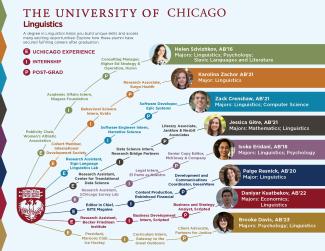
Linguistics is the scientific study of language. At the heart of linguistics is an understanding of:
- The unconscious knowledge that humans have about language
- How humans acquire language
- The general and specific structures of language
- How languages vary
- How language influences the way in which humans interact with each other and think about the world
Linguists investigate how people acquire knowledge about language, how this knowledge interacts with other thought processes, how it varies between speakers and geographic regions, and how to model this knowledge computationally. They study how to represent the structure of various aspects of language (such as sounds or meaning), how to theoretically explain different linguistic patterns, and how different components of language interact with each other. Many linguists employ statistical analysis, mathematics, and logical formalism to account for the patterns they observe.
Linguistics is a major that provides insight into one of the most intriguing aspects of human knowledge and behavior. Majoring in linguistics means learning about many aspects of human language, including sounds (phonetics, phonology), words (morphology), sentences (syntax), and meaning (semantics). It can involve looking at how languages change over time (historical linguistics); how language varies from situation to situation, group to group, and place to place (sociolinguistics, dialectology); how people use language in context (pragmatics, discourse analysis); how to model aspects of language (computational linguistics); how people acquire or learn language (language acquisition); and how people process language (psycholinguistics, experimental linguistics).
